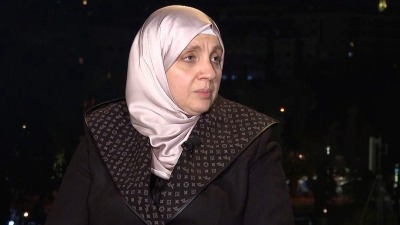Aisha al-Dibs, head of the Women’s Affairs Office in the Syrian caretaker government, sparked a storm of criticism following her interview with the Turkish network TRT. Her remarks about the role of women in the next administration ignited widespread debate on social media. Al-Dibs stated that the new administration aims to create a model tailored to the “reality and circumstances” of Syrian women.
It was evident that Syrian women’s issues would become a contentious topic under the new government, which carries the weight of a deeply conservative Islamic jihadist ideology verging on puritanism.
In the interview, al-Dibs appeared to undermine Syrian women, suggesting they lack the potential and capabilities for leadership. She stated, “I will not open the space for those who disagree with me in thought,” adding, “I do not claim that Syrian women are now empowered, but Syrian women by nature have the qualifications, and if we provide them with training and leadership courses, they will, God willing, participate in legislative and executive authority.”
These statements were met with widespread outrage for dismissing a rich history of Syrian women’s trailblazing contributions to public life. Critics noted that al-Dibs’ comments implied Syrian women are inherently unfit for leadership, contradicting decades of progress and empowerment.
As the first woman to hold an official position in the new Syrian administration, al-Dibs’ assertions have been seen as dismissive of the generations of Syrian women who have held leadership roles globally and have actively worked to empower others.
Regarding the judiciary, al-Dibs remarked, “As for the judiciary, I won’t talk about that because the constitution will determine it, and its anchor is Islamic law. We will not abandon Islamic law.”
This statement raised serious concerns about the role of women in the judiciary, especially amid unofficial reports suggesting that the new government may prohibit female judges based on Islamic law. Such a move would contradict the principles of freedom, democracy, and equal opportunities for all, regardless of religion or orientation.
A Self-Defined Activist and Humanitarian
On her Facebook profile, al-Dibs describes herself as “a public figure and activist in the field of women’s development and the promotion of civil and humanitarian work.” Local reports note that she has a history of activism in Syria and Syrian refugee camps in Turkey.
Eroding Women’s Freedom of Choice
Al-Dibs has emphasized creating a uniquely Syrian model of governance, expressing a clear intent to disregard or distance herself from the contributions of Syrian feminists and human rights advocates both within and outside Syria. She criticized these efforts, stating, “Why should we adopt a secular or civilian model? For example, I will create a model specific to Syrian society—not speaking about myself but about the leadership’s vision.”
When asked about the autonomy of women’s organizations advocating for women’s rights, al-Dibs replied, “If we agree that this support aligns with the model we are building, then welcome. I will not open the way for those who disagree with me. We have suffered in the past from organizations with agendas targeting our children and women, implementing programs and training that yielded disastrous results.”
These statements have been criticized for being illogical and unscientific, diminishing women’s freedom to make critical life decisions, such as those related to marriage or divorce. They reflect an attempt by al-Dibs—and perhaps the new leadership—to curtail progressive feminist and human rights activities that challenge religious interpretations of women’s roles.
A Closed Vision in a Rapidly Changing World
Critics argue that al-Dibs’ rhetoric, drawn from traditional conservative circles, is being promoted as a “Syrian model.” However, even within these circles, her comments have been poorly received. Al-Dibs has also accused international and human rights organizations of contributing to a rise in divorce rates in 2018 in areas where they operated. She claimed these organizations failed to consider “how to empower women while respecting their duties and responsibilities.”
Al-Dibs’ stance implies that divorce is a decision withheld from thousands of women due to religious interpretations granting this right exclusively to men. Consequently, many women remain trapped in unhappy marriages. When given the opportunity, they often seek divorce.
This dynamic is particularly evident among Syrian women who sought asylum in Germany and other European countries. Many pursued divorce to escape harsh and oppressive conditions they could not end in their home societies.
This article was translated and edited by The Syrian Observer. The Syrian Observer has not verified the content of this story. Responsibility for the information and views set out in this article lies entirely with the author.


